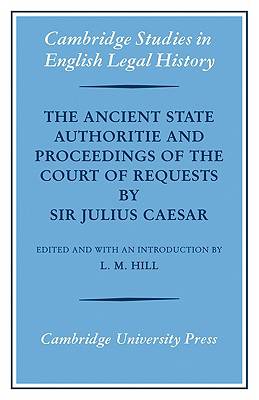
- Afhalen na 1 uur in een winkel met voorraad
- Gratis thuislevering in België vanaf € 30
- Ruim aanbod met 7 miljoen producten
- Afhalen na 1 uur in een winkel met voorraad
- Gratis thuislevering in België vanaf € 30
- Ruim aanbod met 7 miljoen producten
Zoeken
The Ancient State Authoritie and Proceedings of the Court of Requests by Sir Julius Caesar
L M Hill, Julius Caesar
€ 86,45
+ 172 punten
Omschrijving
Sir Julius Caesar was the servant of Elizabeth I, James I and Charles I, serving as Judge of the High Court of Admiralty, Master of Requests, Chancellor of the Exchequer, Master of the Rolls and Privy Councillor. He also sat in the later Elizabethan parliaments and all but one in James' reign. Throughout his long and active career, Caesar preserved hundreds of volumes of his papers. They are largely in the custody of the British Museum and the text of this edition has been taken from BM Lansdowne MS 125. At the end of the sixteenth century English civilians were pressed to defend themselves and their courts against the judicial monopoly which the common lawyers were asserting. While this has often been regarded as a problem of conflicting legal systems and jurisprudential ideologies, it is apparent from Sir Julius Caesar's work that the questions were far more pragmatic than ideological.
Specificaties
Betrokkenen
- Auteur(s):
- Uitgeverij:
Inhoud
- Aantal bladzijden:
- 332
- Taal:
- Engels
- Reeks:
Eigenschappen
- Productcode (EAN):
- 9780521085564
- Verschijningsdatum:
- 14/10/2008
- Uitvoering:
- Paperback
- Formaat:
- Trade paperback (VS)
- Afmetingen:
- 140 mm x 216 mm
- Gewicht:
- 421 g

Alleen bij Standaard Boekhandel
+ 172 punten op je klantenkaart van Standaard Boekhandel
Beoordelingen
We publiceren alleen reviews die voldoen aan de voorwaarden voor reviews. Bekijk onze voorwaarden voor reviews.











